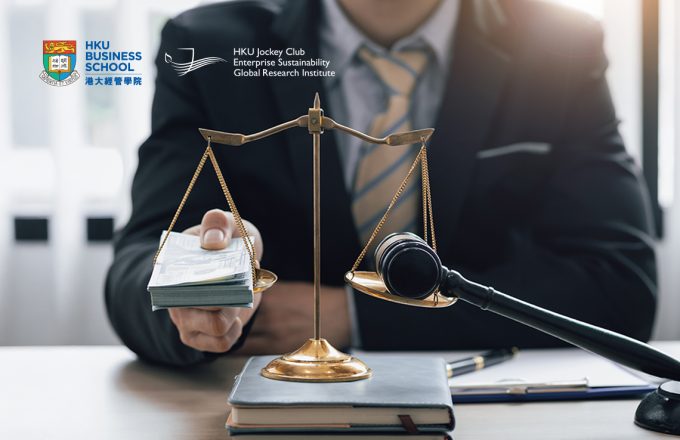Didn’t Earn It? Return It.

When it comes to compensation, an agent is expected to keep that which they are entitled to – this is a fundamental American value[1]. However, since the infamous WorldCom and Enron scandals which rocked markets in the U.S. and beyond in the early 2000s – where executives of both companies received bonuses based on fraudulent financial statements – compensation recovery provisions, known as “clawbacks”, have been imposed to deter fraud and unlawful risk-taking decision-making by executives of financial service providers.
The WorldCom and Enron scandals were a wake-up call and a red flag for regulators that the system did not prevent executives from misstating their companies’ performance – effectively getting compensation that they should not have received, with no consequences. This red flag was raised higher after the 2007-2008 financial crisis, leading to the enactment of the Dodd-Frank Wall Street Reform and Consumer Protection Act – the Dodd-Frank Act for short – in 2010, which brought in sweeping financial regulatory reforms. These affected thousands of listed companies in the United States, representing tens of trillions worth of market capitalisation.
In 2015, the SEC went even further, proposing Rule 10D-1 of the Dodd-Frank Act which aimed to regulate clawback provisions meaning that from 2017, all listed companies would be required to recover excess incentive-based compensation received by an executive officer, if the company had to prepare an accounting restatement to correct serious misconducts like accounting irregularities. This is a fancy way of saying “If you didn’t earn it, you must return it”.
Research conducted at HKU on clawbacks has had a major influence on the SEC’s policymaking process, and has stimulated public debate by offering a holistic discussion on the benefits and shortfalls of clawbacks. The ensuing regulatory reforms have been widely discussed and debated in the media and across the global regulatory community.
Dr Lilian Chan’s research has brought attention to the significance of this subject and the implications on the industry. Her work has revealed a number of insights: that in firms that adopt clawbacks, earnings quality improves, audit fees are lower, auditors are less likely to report material internal control weaknesses, and audit report lags are shorter. Why? Because managers have less incentive to manipulate company earnings when they can anticipate the potential costs to the company, such as the loss of income and reputation.
Dr Chan also discovered that accounting earnings reported by “clawback firms” are more credible and informative from an investor’s point of view; and auditors are more likely to perceive these firms as having lower control risk. Also, the borrowing costs of clawback firms are lower because of better earnings quality.
The research conducted by Dr Chan has not only benefited international scholars, it has had a perceptible effect on the industry itself, documented in the SEC’s rule proposalwhich cites two of Dr Chan’s publications, and public comment which cited her work as grounds to support the proposal.
Dr Lilian Chan, Associate Professor in Accounting and Law, HKU Business School, received the Faculty Knowledge Exchange Award in 2019 for the research accomplishments achieved in this knowledge exchange project. She was one of the ten most promising female associate professors selected by the HKU-10 Mentorship Programme 2018-2019, which aimed to unleash the full potential of women academics to become confident, capable leaders and eliminate barriers to their academic leadership success.
Sources
[1] Aguilar, L.A. 2015. Statement at an Open Meeting on Dodd-Frank Act “Clawback” Provision. https://www.sec.gov/news/statement/making-executive-compensation-more-accountable-.html [2] Chan, L.H., K.C.W. Chen, T.-Y.Chen, and Y.Yu. 2012. The effects of firm-initiated clawback provisions on earnings quality and auditor behavior. Journal of Accounting and Economics 54 (2), 180–196. https://doi.org/10.1016/j.jacceco.2012.05.001 [3] Chan, L.H., K.C.W. Chen, and T.-Y.Chen. 2013. The effects of firm-initiated clawback provisions on bank loan contracting. Journal of Financial Economics 110, 659–679. https://doi.org/10.1016/j.jfineco.2013.08.010 [4] Chan, L.H., K.C.W. Chen, T.-Y. Chen, and Y. Yu. 2015. Substitution between real and accruals-based earnings management after voluntary adoption of compensation clawback provisions. The Accounting Review 90 (1), 147–174. https://doi.org/10.2308/accr-50862 [5] Securities and Exchange Commission. 2015. Listing Standards for Recovery of Erroneously Awarded Compensation. File No. S7-12-15. https://www.sec.gov/rules/proposed/2015/33-9861.pdf [6] Public Citizen. 2015. Comments on Listing Standards for Recovery of Erroneously Awarded Compensation. https://www.sec.gov/comments/s7-12-15/s71215-9.pdf [7] Adoptions of Clawbacks Tied to Earnings Manipulation. 2015. CFO.com. http://www.cfo.com/accounting-tax/2015/01/adoption-clawbacks-tied-earnings-manipulation [8] Clawbacks Can Lead to Accounting Gimmicks. 2015. Accounting Today. https://www.accountingtoday.com/news/clawbacks-can-lead-to-accounting-gimmicks [9] Corporate Financial Weekly. 2015. Study Finds Executive Compensation Clawback Provisions Do Not Eliminate Possible Earnings Manipulation. https://www.corporatefinancialweeklydigest.com/2015/01/articles/litigation/study-finds-executive-compensation-clawback-provisions-do-not-eliminate-possible-earnings-manipulation [10] The National Law Review. 2015. Hong Kong Study Finds Executive Compensation Clawback Provisions Do Not Eliminate Possible Earnings Manipulation. https://www.natlawreview.com/article/hong-kong-study-finds-executive-compensation-clawback-provisions-do-not-eliminate-po







